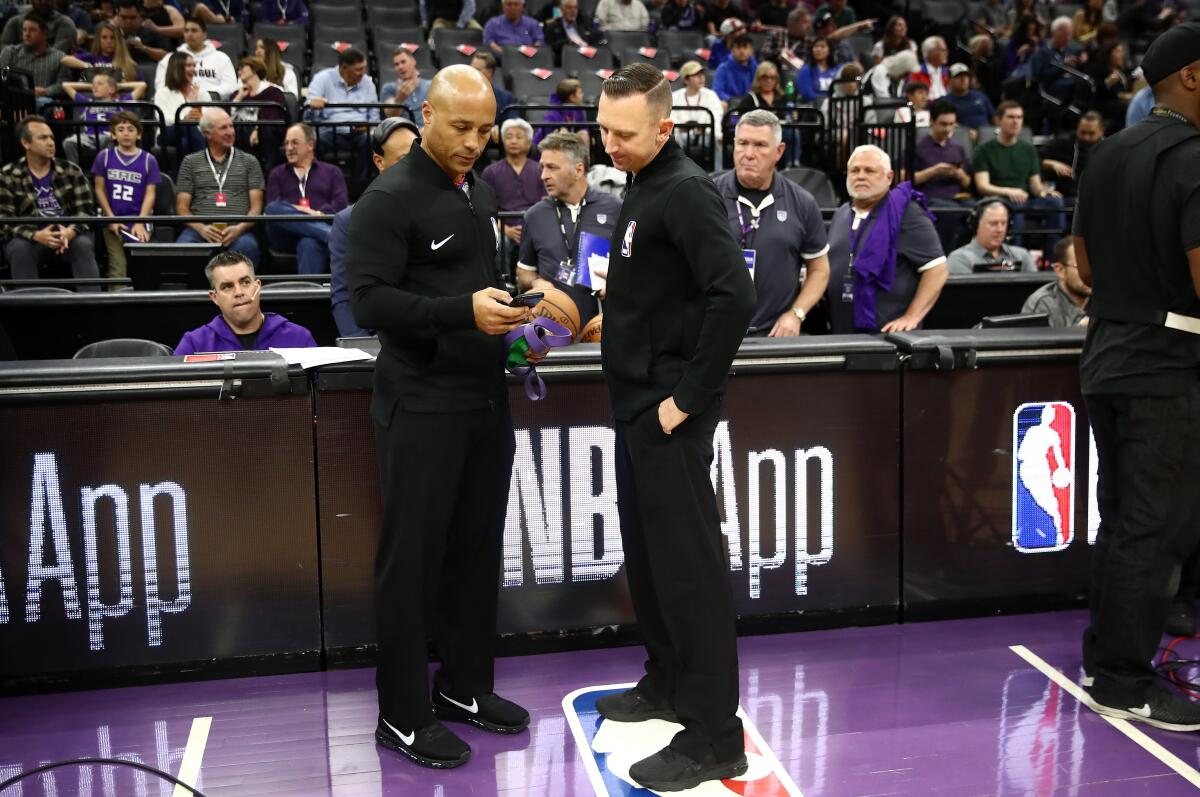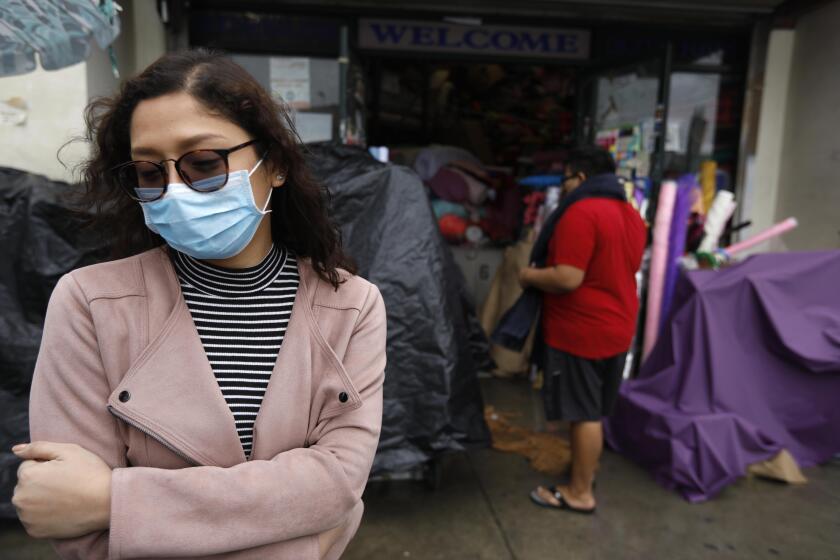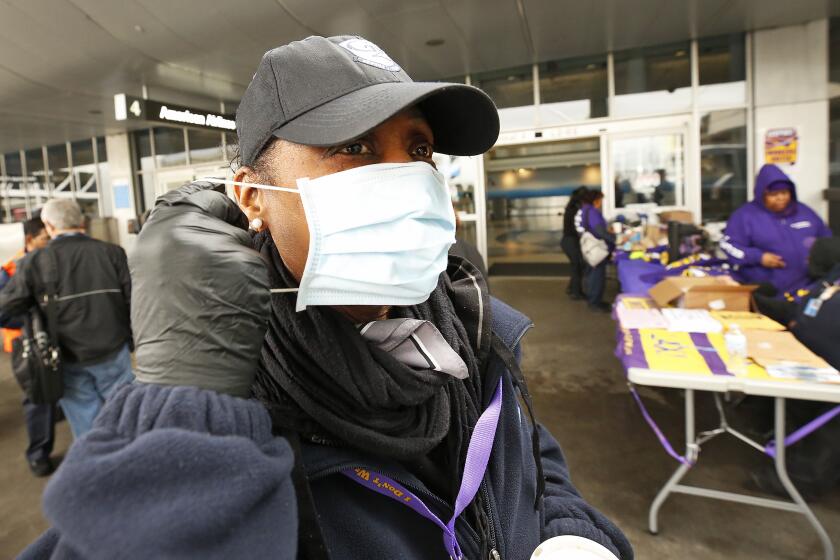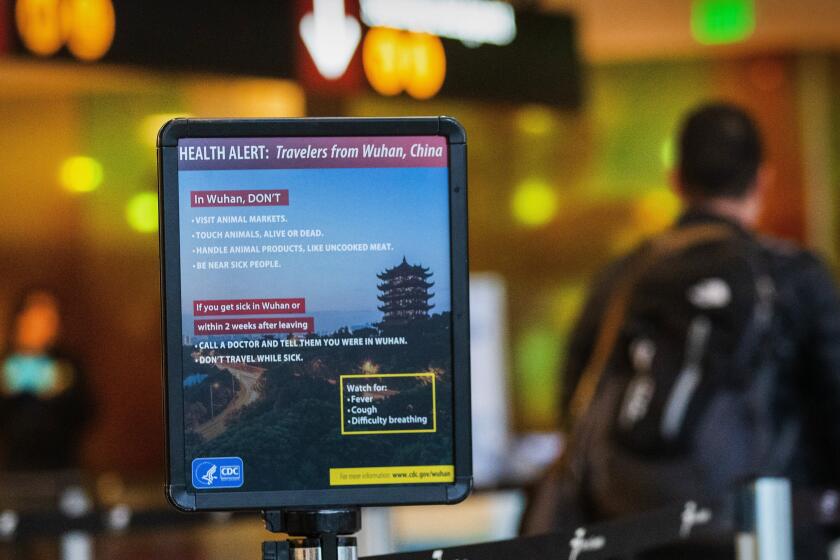L.A. County reports new community-spread coronavirus cases as state total hits 198

- Share via
Coronavirus cases continue to mount across California as counties big and small reported new tallies on Thursday and Disneyland took unprecedented action to close the theme park for the rest of the month.
Los Angeles County health officials confirmed three new cases, two of which had an unidentified source of exposure, suggesting that the virus is actively spreading in the community.
Over the past week, county leaders have stressed the importance of personal responsibility as coronavirus is believed to be active throughout Los Angeles County, which has 32 confirmed cases.
“We’re not at the point of closing down all activities for everybody,” said Barbara Ferrer, director of the Los Angeles County Department of Public Health. “But we are at the point of saying you know who you are. You know how much you can help at this point. We’ve asked for everyone’s help and that means modifying pretty much everything you do outside of your house every day.”
California officials are calling for the cancellation of all gatherings with 250 or more people to slow the spread of the coronavirus. The state has recorded 198 cases of the new coronavirus as of Thursday, up from 177 the day before.
Meanwhile, the United States has surpassed 1,300 coronavirus cases, with most in Washington state, New York and California.
President Trump suspended travel from Europe as the coronavirus continues its spread across the globe Wednesday, claiming its first life in L.A. County and causing the World Health Organization to refer to the outbreak for the first time as a pandemic.
“This is the first pandemic caused by a coronavirus,” WHO chief Tedros Adhanom Ghebreyesus said. “We have rung the alarm bell loud and clear.”
This week, the outbreak brought significant disruption, with a growing number of school closures, event cancellations and travel restrictions.

The WHO has officially declared the coronavirus a pandemic. This is the first pandemic caused by a coronavirus. Infectious disease physician Timothy Brewer of UCLA compares the novel coronavirus to other pandemics, like H1N1, MERS, SARS and influenza.
A call for ‘social distancing’
The new mass gathering policy from the California Department of Public Health, which will be in effect at least through March, marks the first time the state has issued a request for all residents across California to adopt so-called “social distancing” measures and represents a new sense of urgency in the administration’s approach to fighting the virus.
The recommendations have the potential to touch virtually all corners of social life across the state: community meetings, sports events and school theater performances.
In response to the governor’s order, Disneyland announced it will close its Anaheim theme park and California Adventure, beginning Saturday through the end of the month.
Additionally, the Los Angeles Police Department will postpone its graduation ceremony for new officers, which was scheduled for this week at the Los Angeles Police Academy, to avoid a large gathering, according to officials. Such a graduation typically draws 300 people to the training facility near Dodgers Stadium.
“Changing our actions for a short period of time will save the life of one or more people you know,” Gov. Gavin Newsom said in a statement. “That’s the choice before us. Each of us has extraordinary power to slow the spread of this disease. Not holding that concert or community event can have cascading effects — saving dozens of lives and preserving critical healthcare resources that your family may need a month from now.”
In recent days, public health officials have modified their requests to the public, advising people to avoid communal eating, meetings or gatherings with more than 50 attendees and all nonessential travel, both international and domestic. They’ve also advised those who are immunocompromised, pregnant or elderly to consider avoiding gatherings of even 10 people.
Dr. Barbara Ferrer, director of the L.A. County Department of Public Health, said Thursday at a news conference that those who take public transit should wash their hands before getting on a bus or train and after arriving at their destination, and people should take care to wipe down gym equipment and wash their hands before and after working out, she said. Group fitness classes where people aren’t able to stay 6 feet apart should be avoided entirely, she said.
L.A. County health officials continued to urge people — particularly older residents, pregnant women and those with underlying health problems — to be cautious in large crowds or avoid them altogether, but they said the number of cases did not yet warrant closing schools or stadiums.
“We will get to a point, unfortunately, here in L.A. County, where we will be asking for events to close,” Ferrer said. “But we’re not there yet.”
Change has come in the form of telecommuting for work, shortages of hand sanitizer and toilet paper, canceled vacations.
City halls closed, events canceled
Los Angeles Mayor Eric Garcetti on Thursday announced sweeping measures to try to limit the spread of the virus. Garcetti said all city departments were being ordered to postpone or cancel public events and meetings expected to draw 50 or more people. He also called for a ban on all public events and conferences on city-owned properties expected to draw 50 or more people.
He also said visitors were effectively banned from City Hall.
“We are closing City Hall to all non-city employees.” Guests, however, are allowed to attend City Council meetings, he said.
The directive prompted the Griffith Observatory to close, starting Friday. The tourist attraction typically sees 4,000 visitors a day, so limiting that number to 50 “just doesn’t make sense,” said Department of Recreation and Parks General Manager Mike Shull. “It’s just safer. We could create other issues with lines forming.”
The Los Angeles Zoo also will close to the public beginning Friday. Employees will continue to report to work to care for the animals. The closure is expected to last through March 31.
Pasadena city officials announced the city was canceling all “nonessential” city-sponsored events and activities until further notice. Santa Monica announced its city hall building would be closed to the public starting Monday, and its libraries closed starting this weekend, with the facilities remaining closed at least through the end of the month. Cities across the Southland, including Beverly Hills, Glendale, Malibu, Redondo Beach and Santa Ana, have taken similar measures.
Frustration mounted in Manhattan Beach after city leaders learned from a resident that they had coronavirus and were self-quarantined in their home.
The city issued a news release Thursday, noting that local leaders had repeatedly contacted the Los Angeles County Department of Public Health and Supervisor Janice Hahn’s office to find out whether any Manhattan Beach residents had tested positive for coronavirus.
Hahn’s office advised them that the public health department will not confirm COVID-19 to a local entity unless there’s a known public exposure or need to cancel an event or close a facility, according to the news release. Further, under state and federal law, public health investigations are confidential.
“This is very disturbing and seriously disappointing to say the least,” Mayor Richard Montgomery said in a statement. “Not being able to obtain information about COVID-19 cases in our own community is counterproductive to our common goal of protecting our residents.”
Malibu city leaders, faced with questions from residents about whether any residents had tested positive with COVID-19, sent out a news release Tuesday explaining how local leaders aren’t provided with specific details about coronavirus activity.
Meanwhile, San Francisco, which reported 18 cases, up from 14 on Wednesday, and Seattle announced bans on large gatherings, and a growing number of universities moved to hold classes online.
It’s only natural that you’re obsessing about the coronavirus, but that anxiety is neither healthy nor necessary. Here’s why you should stop, and how to do it.
Counties take precautions
Three L.A. County sheriff’s deputies and five L.A. County Fire Department personnel are now under quarantine after answering a Monday call to Walnut to attend to a woman who later died of the coronavirus, Sheriff Alex Villanueva said Thursday.
The woman was taken by ambulance to Pomona Valley Hospital Medical Center in full cardiac arrest, the hospital said in a news release. After arriving at the hospital, she was placed in isolation but died shortly afterward, officials said.
“Our highly trained staff followed all appropriate infection control protocols and took every precaution in caring for this patient, who tragically succumbed to their complications,” Dr. Daniel Gluckstein, the hospital’s medical director of infectious disease, said in a statement. “We extend our deepest condolences to the patient and family.”
The hospital has identified all staffers who came into contact with the patient and is following guidelines issued by the county department of public health regarding healthcare worker exposure, the news release said.
Rapid-fire developments come as the virus continues to spread elsewhere in the state.
Tulare County announced its first case late Wednesday.
Karen Elliott, public health director for Tulare County, said at a news conference that the infected person was tested at Sierra View Medical Center in Porterville and was being kept in isolation at home. The person was in stable condition, “and we hope for a quick recovery,” Elliott said.
“The individual does not fall within a vulnerable population,” she said. Health officials believed the person contracted the virus outside the county, she said.
Riverside County also announced an additional locally acquired case of the virus, bringing the total number of confirmed cases there to eight.
It was announced Thursday that a San Jose firefighter had tested positive and might have exposed other firefighters, city manager David Sykes said.
By Thursday afternoon, four firefighters had tested positive, said Sean Kaldor, president of IAFF Local 230, which represents San Jose firefighters. They worked in different stations, on different shifts, performing different roles, he said.
“As far as how they got exposed, the challenge with COVID-19 is that it’s starting to become prevalent in our community,” he said. “So any patient, any call, any time could be symptomatic with it.”
Two other San Jose firefighters were awaiting results after being tested for the coronavirus, and a total of 77 were on leave to see if they developed symptoms, Kaldor said.
Contra Costa County reported a total of 16 cases, up from 10 the day before.
Ventura County now has 3 cases, up one from yesterday.
The San Mateo County health officer issued an order Thursday banning all mass gatherings of 250 or greater. The order is effective Friday at 11:59 p.m. through April 3 but exempts houses of worship, museums, malls, hospital and medical facilities, and the normal operations of hotels and airports.
Trump announces travel restrictions
The mounting side effects of the virus could be seen across the country: empty subway cars, quiet streets, a longtime Houston rodeo canceled, tours of the Capitol stopped in Washington, and the Dow Jones industrial average entering bear territory after an 11-year bull market.
In a televised address to the nation Wednesday night, Trump imposed stringent new restrictions, barring foreign nationals traveling from Europe from entering the country for 30 days, beginning Friday. The ban does not include the United Kingdom and does not affect travel by U.S. citizens, permanent residents or immediate family members of U.S. citizens.
It applies to any foreign national who has been in Europe during the 14 days prior to their scheduled arrival in the U.S.
“The European Union failed to take the same precautions” as the United States did in barring travel from China, he said, claiming that U.S. clusters of the disease were “seeded by travelers from Europe.”
Trump said he was instructing the Small Business Administration to provide new low-interest loans for some businesses hurt by the outbreak and asked Congress to approve $50 billion in additional funding for that purpose. And he asked Congress again to approve payroll tax relief, a proposal that neither party on Capitol Hill has favored.
In Washington state, Gov. Jay Inslee banned events involving any gathering of more than 250 people in the Seattle metro area — be it Sunday church, a wedding, a concert or a political fundraiser. The ban does not extend to airports, grocery stores or transportation systems such as buses and ferries.
Sen. Dianne Feinstein said she was closing her California offices and considering closing her Washington office because of the coronavirus.
“I don’t want people unnecessarily hurt,” she said in a brief interview. “It’s a big decision.”
She said Senate Democrats were advised in a healthcare meeting to close their offices.
Faced with two outbreaks of coronavirus on its ships and increasing government pressure, Princess Cruises announced Thursday it would suspend all operations for its vacation voyages for 60 days.
The news comes as federal and state authorities undertake a massive operation to disembark 3,500 passengers from the Grand Princess, a number of them infected by the virus, and move them to quarantine sites largely on U.S. military bases.
By Tuesday evening, 1,452 passengers had been transferred from the Grand Princess cruise ship to be quarantined at Air Force bases or flown to their home countries.
On Wednesday, officials continued to allow passengers to leave the ship, on which at least 21 people had tested positive for the coronavirus. That same day, officials announced that 120 people showing signs of illness would be quarantined separately at an otherwise empty hotel in San Pablo.
In a sign of how surreal the disruption of American life looks to become, NCAA tournament games for men’s and women’s basketball have been canceled.
The NBA’s announcement of the indefinite suspension of its season came after a player for the Utah Jazz tested positive for the coronavirus. In a bizarre scene, the game in Oklahoma City between the Thunder and the Jazz was delayed seconds before tip-off and canceled minutes later.
“The NBA announced that a player on the Utah Jazz has preliminarily tested positive for COVID-19,” the league said in a statement. “The test result was reported shortly prior to the tip-off of tonight’s game between the Jazz and Oklahoma City Thunder at Chesapeake Energy Arena. At that time, tonight’s game was canceled. The affected player was not in the arena.”
In an announcement that brought the spreading public health crisis to Hollywood, Tom Hanks and wife Rita Wilson said they had tested positive for the virus.
“Hello, folks,” Hanks said in a statement. “Rita and I are down here in Australia. We felt a bit tired, like we had colds, and some body aches. Rita had some chills that came and went. Slight fevers too. To play things right, as is needed in the world right now, we were tested for the coronavirus and were found to be positive.”
Mounting problems with coronavirus tests are limiting access and sowing confusion
The big conundrum public officials are facing is whether to close school systems.
Seattle announced plans to shut its public schools for two weeks starting Thursday. But Los Angeles, Santa Clara and San Francisco counties are holding off such closures, at least for now.
“In children, the illness has been very mild,” said Dr. Grant Colfax, health officer for San Francisco, adding that they were either showing no signs of physical illness or experiencing mild flu-like
symptoms.
In a study of nearly 45,000 lab-confirmed coronavirus cases, no one under the age of 10 had died of the virus.
Colfax and other health experts raise the possibility that closing schools could actually cause more deaths, as a number of those children stay home with elderly caretakers who are much more likely to succumb to the disease.
Santa Clara County, which has the state’s largest outbreak with 48 confirmed cases, is keeping its schools open for now. But others are closing.
Catholic schools run by the Diocese of San Jose will close Friday for at least two weeks, and begin distance learning on Tuesday. The West Contra Costa Unified School District and San Mateo Union High School District also announced closures beginning Monday; both said instruction would continue with remote learning.
Ross School District in Marin County is closing on Friday; Carmel Unified in Monterey County is shutting schools Friday and intends to begin remote instruction Wednesday.
Classes at Berkeley High School are canceled starting Friday, and classes for Berkeley Unified’s elementary and middle schools are canceled starting Monday.
Palos Verdes Peninsula Unified School District announced Thursday evening that it would close schools from noon Friday until April 3.
“Schools will be open for students and staff Friday, March 13, 2020 from 8:00 a.m. – 12:00 p.m,” Superintendent Alex Cherniss wrote in an email. “During this time, students who do not have a device at home, may sign-out a Chromebook at the main office for use during this closure and other students may stop in briefly to pick up any items (i.e., textbooks, workbooks, etc.) that they may have left behind. We understand that school closure affects all families, and we are committed to addressing the needs of all our learners.”
All public schools in Santa Cruz County have been ordered to shutdown beginning Monday after a case of coronavirus was confirmed at Rio Del Mar Elementary School.
In the Sacramento suburb of Elk Grove, public schools were closed after two family members of students at several campuses tested positive for the coronavirus.
Cases of respiratory illness continued to be reported across the San Francisco Unified School District, which ordered a district wide shutdown Thursday to begin Monday.
Besides the four students suffering from pneumonia, suspected to be caused by the coronavirus, at Lakeshore Elementary, which closed earlier this week, the district Thursday afternoon also ordered a shut down of Glen Park Elementary, where seven students were suffering from respiratory illness.
Researchers estimate that at least 1,043 people were infected with the new coronavirus as of March 1, and the true figure could have been as high as 9,484.
Sacramento County health officials announced Tuesday that a resident at an Elk Grove senior-living facility had become the county’s first fatality from COVID-19.
The woman, 90, was among about 140 patients at the facility.
Dr. Peter Beilenson, Sacramento County’s health director, said other residents of the Elk Grove facility were now subject to special protective measures, including having meals delivered to rooms and not being allowed to congregate in communal areas.
He said the county was changing its goal from trying to keep the virus contained to simply slowing its spread.
That is the approach of the World Health Organization as well.
“Even those countries with community transmission or larger clusters can turn the tide on this virus,” said Tedros, the director-general of WHO.
He said his agency’s calling the disease a pandemic — a word many experts have been using for weeks — doesn’t change the need for more aggressive government responses.
“WHO has been assessing this outbreak around the clock, and we’re deeply concerned both by the alarming levels of spread and severity and by the alarming levels of inaction,” Tedros said.
The coronavirus outbreak has now sickened at least 127,000 people on six continents and caused more than 4,700 deaths.
The objective now is to spread out the inevitable infections so that the healthcare system isn’t overwhelmed with patients.
Public health officials have a name for this: flattening the curve.
Left alone, the virus would race through the population, and the number of cases would shoot skyward and then fall, resembling the shape of a mountain peak. But with containment measures, the curve can be squashed into a wide hill.
The outbreak would take longer to run its course. But if the strategy works, the number of people who are sick at any given time will be greatly reduced.
Ideally, it would fall below the threshold that would swamp hospitals, urgent care clinics and medical offices. That’s why public health officials will continue the labor-intensive work of recording and tracking new infections, ensuring that infected individuals stay home and guarding the borders against the arrival of new cases.
At the same time, they’ll expand their mitigation efforts, such as canceling events and encouraging people to work from home. Many universities are moving their classes online; on Wednesday, Cal State Long Beach, Cal State L.A., Cal State Northridge, Pepperdine and Chapman universities announced such measures.
In some ways, mitigation is just containment on a larger scale. Instead of focusing on a single infected individual, officials target clusters of infected people.
Buildings, city blocks or whole neighborhoods might be identified as infected, then walled off. That’s why New York Gov. Andrew Cuomo dispatched the National Guard to suburban New Rochelle to enforce a “containment zone” around a community with more than 100 infected residents.
Even when infections are unavoidable, pushing them into the future will increase the chances that a treatment will be available by the time a patient needs it. Some might even benefit from a coronavirus vaccine, though that is nearly a year away, at best.
“What we have to do right now is to put a lid on this epidemic, to flatten the curve of infection and buy ourselves some time to get a vaccine,” said Georgetown University’s Lawrence Gostin, an expert in public health law. “We are going to have to think about bringing all the interventions we have up to scale.”
Times staff writers Jennifer Haberkorn and Noah Bierman in Washington, Rong-Gong Lin II in San Francisco, Anita Chabria, Taryn Luna and John Myers in Sacramento, Melissa Healy in New York and Josh Rottenberg, Dan Woike, Soumya Karlamangla and Jaclyn Cosgrove in Los Angeles contributed to this report.
More to Read
Sign up for Essential California
The most important California stories and recommendations in your inbox every morning.
You may occasionally receive promotional content from the Los Angeles Times.



















